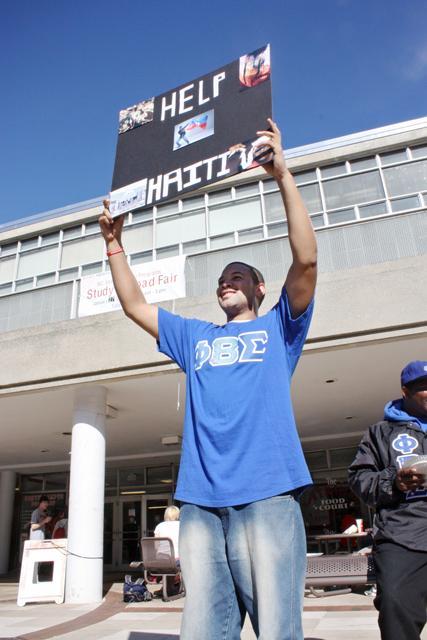Listen to this story as it was recorded for the Jan. 25 episode of Eye on the Triangle:
The damage of the 2010 earthquake persists as Haiti struggles to recover. Along with the international community, the University has invested interest and resources in the rebuilding of Haiti. However, efforts have diminished while the Haitian cause remains desperate.
In the aftermath of the 7.0 magnitude earthquake in Haiti, the destruction caused by the disaster seemed unimaginable. The country — which has endured the trials of slavery, dictatorships and now the earthquake — may suggest a story of suffering. But not all the news is bad. Soon after the earthquake, the NCSU community mobilized to contribute to the recovery efforts.
Soon after the earthquake, Student Government launched the Howl for Haiti project to raise money for assistance in the recovery. Under the guidance of Howl for Haiti, student organizations across campus raised money to contribute to the non-profit organization Stop Hunger Now.
“Stop Hunger Now contacted the University and put a call to action out to raise funds,” Student Body President Kelly Hook said. “We decided to put the project on a time frame and raise as much as possible for six months. Student Government’s role was one of a manager, but students collaborated across campus.”
Stop Hunger Now, a Raleigh based non-governmental organization, has maintained a strong relationship with both N.C. State and Haiti. Before the earthquake, Stop Hunger Now worked in Haiti, mainly providing food for school lunches. After the earthquake, the University and Stop Hunger Now quickly partnered in the Howl for Haiti campaign and raised over $85,000 for the Haitian cause.
“We’re really fortunate to have been partners with Stop Hunger Now,” Mike Giancola said. Giancola, the director of the Center of Student Leadership, Ethics and Public Service, explained that the University first became involved with Stop Hunger Now after the 2005 tsunami in South Asia.
“Since that time our partnership has grown,” Giancola said. “We envisioned the University Million Meal event to help to package upwards of one million meals.”
Days before the earthquake, Stop Hunger Now delivered packaged meals to Haiti. Once the infrastructure of the country collapsed, the organization deployed the bagged meals instantly.
The meals, which are packaged during the Service N.C. State event, mix rice, soy-protein extract, dehydrated vegetables and vitamins in a 13-ounce package.
“They are designed to scientifically deal with nutrition deficiencies that many young people around the world face,” Giancola said.
Howl for Haiti raised much of the money through a T-shirt drive and a benefit concert. According to Hook, the student bookstore partnered with Howl for Haiti to sell the $10 T-shirts, which sent all proceeds to the charity.
“We sold out and ordered a second back and sold out again,” Hook said.
Despite the success of Howl for Haiti, the project has now been terminated. Student Government has turned its service focus to more local and domestic causes. Howl for Haiti will remain defunct at the current moment, unless students want to revive the charity.
“Student Government fulfills student demand,” Hook said. “If students overwhelmingly say that they would like to campaign and fundraise on behalf of Haiti, I am all about leading that effort.”
Within months of the earthquake, as the novelty and publicity of the rebuilding of Haiti diminished, and so did the funds. Much of the aid pledged has not and may never be realized. According to the Associated Press, Secretary of State Hillary Clinton’s promise of $1.15 billion for long-term development in Haiti has not yet been allocated.
“This is a trend that isn’t unique to N.C. State,” Chris Adkins, a junior in mechanical engineering, said, “it’s a global trend.”
Adkins works as the CSLEPS Direct of Hunger and Homelessness Issues of the Service Leadership Team. His committee has worked to spread awareness of hunger issues, and since the earthquake much of his attention has been focused on Haiti.
“Just a few months after [the earthquake], the donations just drop way off,” Adkins said. “It definitely teetered off some. Therefore, we started putting our resources into general awareness.”
The story of Haiti’s recovery will face immense scrutiny, but with the country’s track record, corruption may hinder reconstruction. Last week, the country’s former dictator, Jean-Claude Duvailer, returned to Port au Prince from exile. His presence looks to influence upcoming elections. This political instability also threatens foreign aid.
“Often times, the aid actually realized is not more than 10 or 15 percent,” Giancola said. “This happens for a whole variety of reasons, be it political, due to corruption or certain benchmarks.”
Despite the uncertainty, hope lingers. Currently, Giancola is in Haiti volunteering with a local NGO called Together We Can.
“I will be part of a group of 23 folks,” Giancola said, “and the main premise is to connect individuals and needs. We don’t have any paid staff. We’re trying to connect and provide synergy for things already going on.”
The team of volunteers will participate in medical clinics and construction projects to “be helpful in some small way.”
Ultimately, the future of Haiti will not be decided by dollars pledged or withheld by donors, but rather by the actions of individuals. The U.S. and Germany poured $10 billion within decades of the Jan. 12 earthquake. Giancola said acknowledging the needs of people and then connecting them to a wider community is the cornerstone of lasting service.
“When we come together, there is nothing that we can’t accomplish,” Giancola said. “We are a community that can care and that can act compassionately. I want to applaud the student leadership and everyone else involved to stay active and engaged.”








